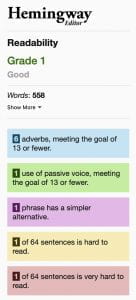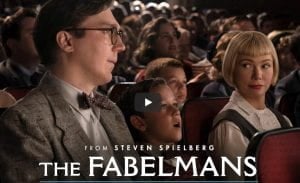This may, or may not, help budding writers: What is the best way to edit your manuscript? Here’s my take, based on the experience of two novels:
Step 1: Finish your Manuscript, then throw it aside for a few weeks. Return to it and read it through, noting obvious errors. Each time you step away from your manuscript you come back to it from a fresh perspective. Note: your first draft is always (yes, always) inadequate.
Step 2: Use an Online Editor. I like using prowritingaid or, more recently, grammarly. Both of these help identify issues such as repeated phrases, over-use of adverbs, sentence lengths, etc. I don’t recommend paying a subscription service, unless for a short period (e.g. a month) in order to check your entire manuscript. A feature I liked as the one where (in prowritingaid) where you can compare your style to another author. You may not be a Hemingway fan, but I like the simplicity of checking chapters in the Hemingway app. Here’s an example from my new novel (with the Hemingway result alongside);
 Nikolai had a glass in hand and a faraway look. The lighting cast deep shadows in the folds of his face. He seemed angry, or drunk, or both.
Nikolai had a glass in hand and a faraway look. The lighting cast deep shadows in the folds of his face. He seemed angry, or drunk, or both.
“Wow, that’s a stunning photo of the old man and the sea; a perfect Hemingway moment.”
“I read a Hemingway book at school.”
“Which one? He wrote many.”
“The one about an old man and the sea.”
“About catching a big fish?”
“You remember. Yes, a poor fisherman in Cuba had caught nothing for eighty-four days.”
“It’s been that long since I had a boyfriend. How do you know this detail from the novel?”
“Because it was the same number of days as the title of another book I read, called Nineteen Eight Four.”
“Oh, I see what you mean. “Did you like the story about the old man and his fishing?”
“I loved it because it was the shortest novel we had in our English course. I had to learn some quotes for the final exam, such as, ‘Why do old men wake so early? Is it to have one longer day?'”
“I bet the old man we just saw woke up early.”
“And now, he’s fortified for a long day.” They giggled.
“How old do you think he was?”
“Seventy? Eighty? It was difficult to tell.”
“No idea. I looked at my phone for a bit and missed his exit.”
“You’re always on your phone. If you weren’t married to it you might find a boyfriend.”
“Did you ever have the hots for Hemingway?”
“Course not, I just loved his writing; short, intense, and so easy to read.”
“But you must have lusted after his type; a rugged outdoor man with a bushy beard and all that?”
“No, silly. Even if I had fallen for him, it would be short-lived.”
“He had four wives. His longest marriage was to his writing, and even that had a sad ending.”
“He wrote the last chapter of his life. Like his relationships, it was brief.”
Step 3: Join a Writing Circle. This is, I’m my humble opinion, the MOST important step. Get a writing-circle to review your work. This circle should consist of other writers or readers in your genre who will give constructive advice and not hold back on any criticism. For example, one of my fellow writers gave such good feedback that I rearranged my chapter order, changed the ending, and built a more authentic and powerful plot. And I was able to reciprocate and also offer him advice on his new book.
Step 4: Find a Professional Editor. There are many people who have experience in the publishing trade who are happy to review your work. I used one to check my submission trio – the Query Letter, Synopsis, and first three chapters. Their fixes and recommendations were so good that I asked them to check over other key chapters in my novel. What I especially liked was an experienced editor’s positive encouragement with, “I have a good feeling about this book.” Now, I just need a literary agent to agree.
Final Note: Don’t let any of the above steps change your own writing style. Stay true to who you are as a writer and use the steps to improve your style, rather than force it into someone else’s.
 Our final year in Senior English was led by a stern teacher. He had us run across the field and back again, then said, “Now, write about your experience—how you feel.” Between short breaths we did. And, I learned an important lesson—you can’t beat experience. Good writers have lived the moment and mature writers have lived more. Hemingway is a good example and there are many others. Like many writers, Robin Palmer’s first novel was autobiographical. Also like many writers, her first novel was not published. Since that first manuscript, she’s published 10 books. Yet it wasn’t until her forthcoming novel The Corner of Bitter and Sweet—the story of a sixteen-year-old girl dealing with her mother’s alcoholism and subsequent recovery—that she decided to dip back into my own experience. Determined not to repeat the same mistakes, she made certain to keep four tips in mind. Here are the three I relate to:
Our final year in Senior English was led by a stern teacher. He had us run across the field and back again, then said, “Now, write about your experience—how you feel.” Between short breaths we did. And, I learned an important lesson—you can’t beat experience. Good writers have lived the moment and mature writers have lived more. Hemingway is a good example and there are many others. Like many writers, Robin Palmer’s first novel was autobiographical. Also like many writers, her first novel was not published. Since that first manuscript, she’s published 10 books. Yet it wasn’t until her forthcoming novel The Corner of Bitter and Sweet—the story of a sixteen-year-old girl dealing with her mother’s alcoholism and subsequent recovery—that she decided to dip back into my own experience. Determined not to repeat the same mistakes, she made certain to keep four tips in mind. Here are the three I relate to:
 Nikolai had a glass in hand and a faraway look. The lighting cast deep shadows in the folds of his face. He seemed angry, or drunk, or both.
Nikolai had a glass in hand and a faraway look. The lighting cast deep shadows in the folds of his face. He seemed angry, or drunk, or both.